May 31, 2019
Air Date: May 31, 2019
FULL SHOW
SEGMENTS
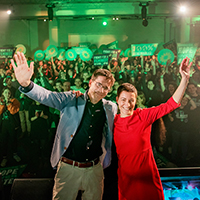
Green Wave Sweeps European Parliament
View the page for this story
Growing concern about climate change and increasing political fragmentation have helped usher in a new wave of Green party members to the European Parliament, which holds its elections every five years. Jon Henley, Europe correspondent for the Guardian, tells Host Bobby Bascomb about what’s on the Green agenda and how deconsolidated power in the European Parliament will encourage parties to compromise. (07:57)

Beyond the Headlines
/ Peter DykstraView the page for this story
In this week's trip beyond the headlines, Peter Dykstra and Host Bobby Bascomb discuss how the EPA may loosen regulation of perchlorate, an endocrine disrupter and likely carcinogen, in the United States’ water systems. Then, they look at a recent study showing that two-thirds of the world's rivers are awash with antibiotics. Finally, the pair discuss the Salton Sea, an enormous lake that was accidentally created in California in 1905. (04:22)
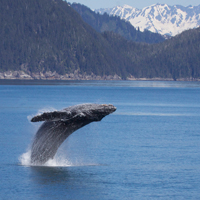
The Law of Languages
View the page for this story
Every human language that’s been tested follows a similar pattern called Zipf’s law. Now researchers are looking to see if non-human languages like dolphins and whales follow a similar structure. Laurance Doyle from the SETI Institute tells Host Bobby Bascomb about some of his surprising results. (08:27)
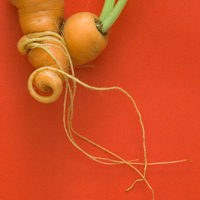
Misfit Produce at Your Doorstep
View the page for this story
If food waste were a country, it would be the world’s third largest emitter of greenhouse gases. Here in the US, food is often thrown out simply because it doesn’t look good enough. Recently, a crop of companies have popped up with an entrepreneurial solution to food waste: they sell less than perfect produce straight to consumers. Host Bobby Bascomb talks with Abhi Ramesh, CEO of Misfits Market about how it works. (08:15)
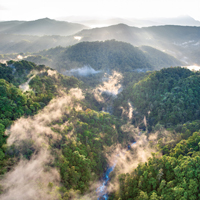
Our Planet
View the page for this story
Our Planet is an inspiring nature documentary series narrated by the renowned Sir David Attenborough. The eight-episode Netflix original provides viewers with majestic scenes of our natural world, through the sobering lens of climate change. Keith Scholey, a lead producer of the series, talks with Host Bobby Bascomb about what it took to produce the series and why Our Planet calls viewers to action. (15:21)
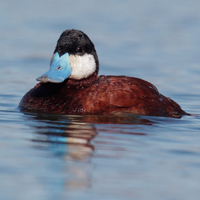
BirdNote®: Ruddy Duck
/ Michael SteinView the page for this story
In marshy lakes and ponds across North America, the spring breeding season may bring the colorful Ruddy Duck. With a black head, white face, and blue bill, the ducks stand out in a crowd but they may be best known for their creative courtships. BirdNote®’s Michael Stein has more. (01:54)
Show Credits and Funders
Show Transcript
HOST: Bobby Bascomb
GUESTS: Laurance Doyle, Jon Henley, Abhi Ramesh, Keith Scholey
REPORTERS: Peter Dykstra, Michael Stein
[THEME]
CURWOOD: From Public Radio International – this is Living On Earth.
[THEME]
BASCOMB: I’m Bobby Bascomb.
A "Green Wave" sweeps the European Parliament’s latest elections.
HENLEY: They've proved themselves to be very responsible and very effective in government. When you compare the Greens who've been in government to the kind of wackier fringes on the kind of nationalist, populist end of the spectrum, then the Greens really start to look like the adults in the room.
BASCOMB: Also, the nature documentary series Our Planet features the wonders of nature, but comes with a warning.
SCHOLEY: We've only been able to have agriculture and everything like this because of the stability nature gives the world. If you start taking that stability out, our agriculture systems won't function. If rainy seasons and seasons go all over the shop. It doesn't work like that, so we have to partner with nature.
BASCOMB: That and more this week on Living on Earth – Stick Around!
[NEWSBREAK MUSIC: Boards Of Canada “Zoetrope” from “In A Beautiful Place Out In The Country” (Warp Records 2000)]
[THEME]
Green Wave Sweeps European Parliament
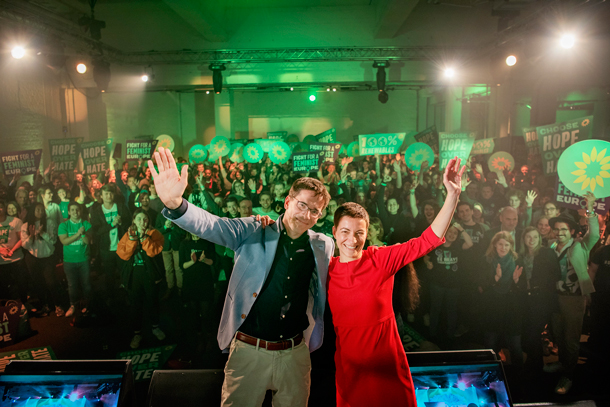
A “green wave” swept the European Parliament on May 26, 2019 as Green parties across Europe had their strongest-ever EU parliamentary election performance. Bas Eickhout (left, the Netherlands) and Ska Keller (right, Germany) are two of these recently-elected Green European parliament members. (Photo: © Sien Verstraeten / European Greens)
BASCOMB: From PRI and the Jennifer and Ted Stanley Studios at the University of Massachusetts Boston, this is Living on Earth. I’m Bobby Bascomb, in for Steve Curwood.
Every 5 years, citizens of the European Union elect new representatives for the EU Parliament. And in the elections that wrapped up on May 26, voters gave a clear signal that the environment was high on their list of priorities. Green party members gained roughly 20 seats on top of the 51 they had previously, many at the expense of some center-left seats. For more, Jon Henley, a Europe correspondent for the Guardian, joins me now from Paris. Welcome to Living on Earth, Jon!
HENLEY: Thank you.
BASCOMB: So, Jon, just how big and where were the Green party's wins this go-around in the EU Parliament elections?
HENLEY: Well, they were, they were big. And they were unexpected. I guess the big standout performance was in Germany, where the Green Party actually finished second, behind the ruling sort of center-right conservatives of the Chancellor, Angela Merkel, and they beat her coalition partners, who are the big Social Democrat, kind of center-left Party in Germany. And they came in on around about 18%. I mean, they basically doubled their score in Germany over the previous European Parliament elections. So, they finished second in Germany, they also finished second in Finland. And really surprisingly, something that nobody saw coming at all, they finished third in France, where they're led by a, kind of a former leading Greenpeace official in France called Yannick Jadot. And they stole a lot of votes, particularly from the sort of Democrat center-left party in France.
BASCOMB: What do you think propelled so many people to vote for the Green Party this time?
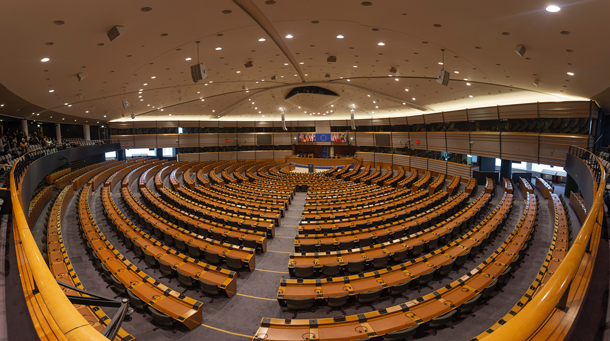
The Louise Weiss building in Strasbourg, France is the seat of the European Parliament and its 751 members. (Photo: Oprea Marius on Unsplash)
HENLEY: Well, there's several reasons. The main one, I guess, pretty obviously, is that the climate crisis has really shot up everybody's agenda in Europe over the last few months. We've had the kind of Friday for Future protests, which have got masses of young people -- school students and, and college students -- out on the streets, you know, in towns and cities around Europe. We've had the two big kind of UN Climate reports, really saying that, effectively, time is running out. So, people have become a lot more conscious of the whole climate debate in Europe, and they turn logically enough to the party that has had a very strong stance on the environment for many years now, which is the Greens. That's one factor. A second factor, particularly in kind of northwestern Europe -- countries like Sweden, and Germany, and Denmark, and the Netherlands -- increasingly, the national Green parties in those countries are either in the national government, like they are, for example, in Sweden, they're part of the governing coalition that runs the country, or they're in kind of regional governments and local government. That's particularly the case in Germany, they co-run 11 out of the 16 German states. And they've proved themselves to be very responsible, and very effective in government. And as one sort of political scientist said to me the other day, you know, when you compare the Greens, who've been in government, local and national government, to the kind of wackier fringes that you see, you know, coming up on the kind of nationalist, populist end of the spectrum, then, you know, if you're a reasonably progressive voter, then the Greens really start to look like the adults in the room. And I guess the final reason is that they're really benefiting from a trend that we've seen across Europe over the last two or three, four years, which is a complete kind of fragmentation of the political landscape. Basically, the two big parties that have run most European countries since the end of the Second World War, kind of the center-right, Christian Democrat, kind of conservative parties, and the center-left Socialist, Social Democrat parties -- are really kind of shrinking quite quite rapidly and quite fast. And they're being supplanted by, or they're losing lots of votes to, a whole range of smaller parties, both on the, on the right, on the far right, so the kind of nationalist populist fringe, but also on the left. And the Greens are very much part of that progressive move.
BASCOMB: Well, what are the Green Party members saying about how they plan to use their growing influence in the new Parliament? What's on their agenda?
HENLEY: Okay, well, the top of the agenda clearly is real urgent climate action. They basically want kind of deeds, not just words, they really want kind of Europe to step up to the plate on the environment. They're after things like CO2 carbon pricing; they're after things like, you know, really trying to reduce aviation, they're after a very serious reform of agriculture, a kind of greening of agriculture. But what's also very important to the Greens in Europe is that they want all that to be done very much with an eye on kind of social justice. And so it must be done fairly. They don't want it to be the ordinary people who pay for this kind of green transition, the energy transition, they want to make sure that it's corporations and the polluters, basically, who pay for the transition.
BASCOMB: I understand then, that the Green Party has just enough power now to sort of be the kingmakers in the Parliament, to influence the other parties that have more representation. Is that right?
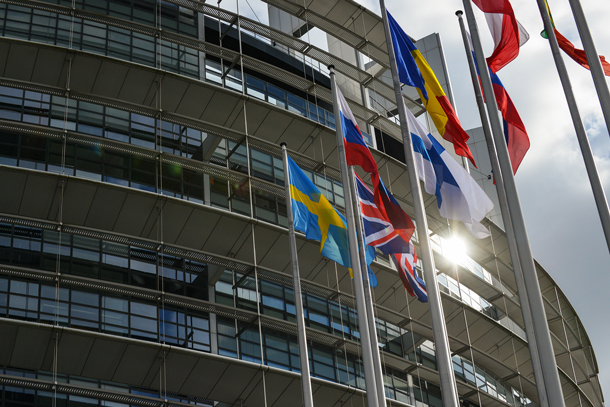
The flags of the European Union’s 28 member states fly outside the European Parliament building in Strasbourg. (Photo: European Parliament, Flickr CC BY-NC-ND 2.0)
HENLEY: That's exactly right. I mean, essentially, they have about 10%; it's, you know it's not a massive percentage, it's only about 10% of seats. So in order to maintain a pro-European majority in the Parliament, and to pass legislation, the big two party groups are going to have to turn to the Liberals and the Greens, and that's where the Greens think that they can really use their leverage, you know, they can really say, okay, we're prepared to back you, we're prepared to give you the votes to get this legislation through. But we want our concerns recognized and acted on.
BASCOMB: So, many of the kids that are participating in the Fridays for our Future youth climate strike with Greta Thunberg that you mentioned earlier, they'll be old enough to vote in the next election in 2024. Do you think that might mean more Green party wins in the future?
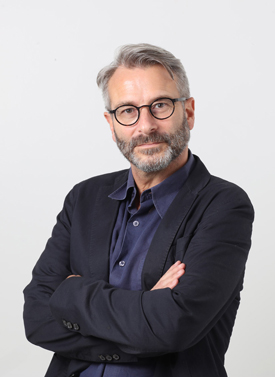
Jon Henley is the Europe Correspondent for the Guardian. (Photo: Courtesy of The Guardian)
HENLEY: I think it very well could, yes. I mean, already the youth vote was hugely important. Young people were the largest voters for the Green Party in France. One in three people who voted for the Green Party in Germany were under 26, which is a massive percentage, particularly when you consider, you know, that typically young people don't vote in nearly such numbers as old people. So the Greens are really getting the young people out to vote, those who could vote, who'd reached 18. Now, we have seen Green surges in the past in Europe. The last was, for example, after the Fukushima nuclear plant explosion in Japan quite recently; there was a big spike in support for the Green Parties. But it kind of ebbed away, it faded. And I think most people looking at what's happening now and looking at the strength of feeling, particularly of young people across the continent, and the urgency of the climate crisis, you know, most political scientists and commentators and observers are pretty confident that, you know, this isn't a surge that's going to kind of peak anytime soon. There is genuine concern about the climate crisis, and that concern is going to continue.
BASCOMB: Jon Henley is a Europe correspondent for The Guardian. Jon, thanks so much for taking this time with me.
HENLEY: It's a pleasure.
Related links:
- The Guardian | “European elections: triumphant Greens demand more radical climate action”
- Read the latest United Nations Climate Reports
- About the Fridays for Future youth climate strike movement
- About Jon Henley
[MUSIC: The Doors, “The End” (Edited version from the film “Apocalyse Now”)]
Beyond the Headlines

The EPA is considering tripling the allowed amount of perchlorate in drinking water systems throughout the United States. Perchlorate is an endocrine disrupter and a likely carcinogen. (Photo: polaristest, Flickr, CC BY-NC-ND 2.0)
BASCOMB: It's time for a trip now beyond the headlines with Peter Dykstra. Peter's an editor with Environmental Health News, that's EHN.org and DailyClimate.org. Hey there, Peter, what do you have for us this week?
DYKSTRA: Oh, hi, Bobby. EPA Administrator Andrew Wheeler recently was asked about climate change. He said climate change is not the most important environmental issue facing the world. He said that threats to the world's water is more important. But here's something that his agency is in the middle of doing that sort of puts a question mark next to that. They are considering tripling the allowable amount of perchlorate in drinking water.
BASCOMB: Perchlorate -- that's a chemical found in rocket fuel, right? I mean, obviously don't want that in water.
DYKSTRA: It's found in rocket fuel. It's used in a number of other industrial applications. It's considered an endocrine disruptor that can affect the thyroid system in humans, as well as being a likely human carcinogen. That determination is from the EPA, from Mr. Wheeler's agency. Critics say that this is one more gift to industry, to the military, and to municipal drinking water systems, all of whom would have an obligation to clean up perchlorate. Now it makes clean up less of a problem for industry, and possibly more of a risk for anyone who enjoys drinking water.
BASCOMB: That's most people I think! Well, what else do you have for us this week?
DYKSTRA: A report done by scientists at the University of York in the UK. You hear names like the Thames, the Tigris, the beautiful blue Danube, the great rivers of the world. Two-thirds of the world's rivers, according to this report, are awash with antibiotics.
BASCOMB: Oh, man. I mean, I knew that you find a lot of hormones in water from, you know, birth control and things like that. But antibiotics, how's that getting in the water?
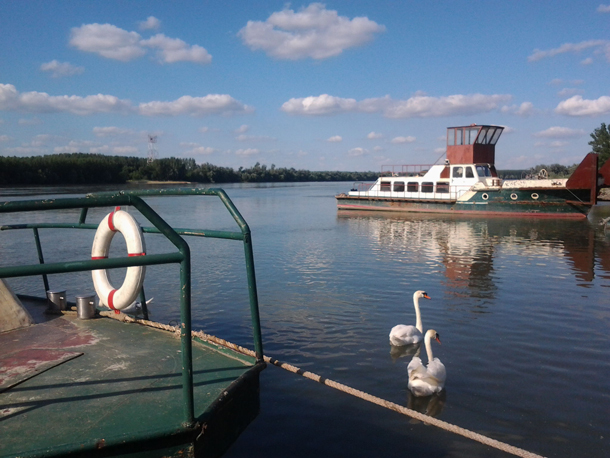
For all the tested rivers in Europe, the Danube was shown to have the highest level of antibiotic contamination. (Photo: Lombady Poplar, Flickr, CC BY-NC 2.0)
DYKSTRA: Well, the beautiful blue Danube is not necessarily blue because of the Viagra in there. But there are also high levels of antibiotics used to treat humans, and used in agriculture as well. Things like Cipro, ciprofloxacin, and these chemicals, these drugs make their way through even the best sewage treatment plants. Because those plants are designed to treat sewage, not chemicals.
BASCOMB: And how might antibiotics in the water affect the fish and wildlife that depend on these systems?
DYKSTRA: The study looked at rivers in both the developed world and the developing world. One case study was in Kenya, where the scientists said that there are rivers in Kenya with such high antibiotic levels, that those rivers can no longer support fish populations.
BASCOMB: Oh, man. Well, is there anything to be done about it?
DYKSTRA: More monitoring for now. More judicious use of antibiotics, already known to be a problem in agriculture in promoting antibiotic resistance. A lot of the drugs we use to fight disease may no longer be effective in future years. Antibiotics are a potential problem worldwide in humans, in agriculture, and not just in rivers.
BASCOMB: Well, what do you have for us this week from the history vaults?
DYKSTRA: We'll go back to May 29, 1905, when a poorly designed irrigation canal in Southern California failed; levee broke, billions of gallons of Colorado River water rushed into a deep depression in the Southern California desert and created California's biggest lake, an accidental lake called the Salton Sea.
BASCOMB: And the Salton Sea, that's a pretty important spot for migratory birds, right?
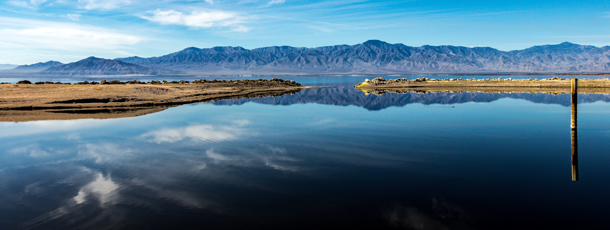
The Salton Sea, a lake in California that was created accidentally, is threatened by drought and changes in the diversion of the Colorado River. (Photo: Kevin Dooley, Flickr, CC BY 2.0)
DYKSTRA: And it also became a pretty important spot for tourists getting away from other parts of the desert in Southern California, including LA. Recently, the Salton Sea has been threatened with contamination from not just agricultural chemicals, but also all the alkalinity, all the desert salts. The biggest problem right now is that the Salton Sea is drying up and that a layer of dust around the outside of the drying Salton Sea has created some huge asthma problems in Southern California.
BASCOMB: All right. Well, thanks for bringing us that news. Peter.
DYKSTRA: Oh, I'm always so happy to bring you such depressing news. I'll try and get some good news in next week.
BASCOMB: All right, we'd appreciate that. Peter Dykstra is an editor with Environmental Health News. That's EHN.org and DailyClimate.org. For more on these stories, check out our website LOE.org.
Related links:
- ThinkProgress | “EPA Wants to Triple Level of Rocket Fuel Chemical Allowed in Drinking Water”
- Read the EPA’s proposed perchlorate rule change
- The Guardian | “World’s Rivers ‘Awash With Dangerous Levels of Antibiotics’”
- Read a feature from The Verge on the Salton Sea
[MUSIC: Duke Ellington/Louis Armstrong, “It Don’t Mean a Thing If It Ain’t Got That Swing” on At Duke’s Place – The Greatest Hits, Parlophone Records Ltd]
BASCOMB: Coming up –less than perfect produce avoids the landfill and gets delivered directly to consumers. That’s just ahead on Living on Earth.
ANNOUNCER: Support for Living on Earth comes from Sailors for the Sea and Oceana. Helping boaters race clean, sail green and protect the seas they love. More information at sailors for the sea dot org.
[CUTAWAY MUSIC: Duke Ellington/Louis Armstrong, “It Don’t Mean a Thing If It Ain’t Got That Swing” on At Duke’s Place – The Greatest Hits, Parlophone Records Ltd]
The Law of Languages
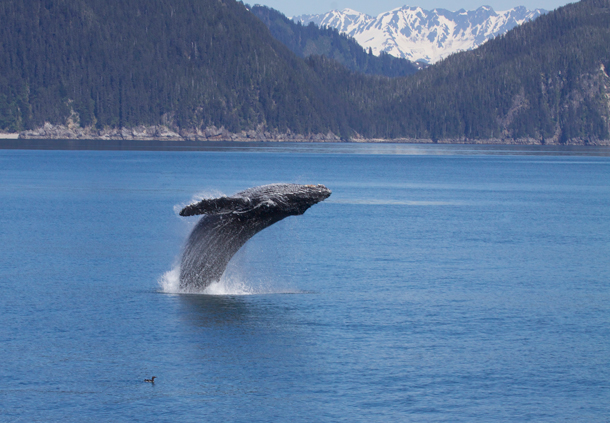
Humpback whales are known for communicating through their low songs. (Photo: Gregory Smith, Flickr, CC BY-SA 2.0)
BASCOMB: It’s Living on Earth. I’m Bobby Bascomb.
Human languages can sound so different; it may be hard to imagine that Chinese…
[PERSON SPEAKING CHINESE]
BASCOMB: … has anything in common with French…
[PERSON SPEAKING FRENCH]
BASCOMB: … Or Arabic…
[PERSON SPEAKING ARABIC]
BASCOMB: But back in 1945 George Zipf, a linguist, discovered every human language he studied all had at least one feature in common, which he named Zipf’s law. Zipf’s law states that the most common word in a given language is used exactly twice as frequently as the second most common word and three times more often than the third most common word and so on. So if you put each word on a graph, they all fit very neatly at a 45 degree slope. That got Laurance Doyle wondering if Zipf’s law can be applied to non-human languages. Laurance is an Astronomer for the SETI Institute, that’s the Search for Extraterrestrial Intelligence, but for this research Laurance began looking much closer to home, at the animals on our own planet. Laurance Doyle welcome to Living on Earth.
DOYLE: Thank you. Nice to be living here.
BASCOMB: [LAUGHS] Indeed. So what animals have you studied so far?
DOYLE: Our extensive study has squirrel monkeys, ground squirrels, bottlenose dolphins, humpback whales, and humans. Those are the ones I've been involved in. And I think I would have to guess there are at least a dozen other species that people are applying our, the information theory work to. And so we decided to start with bottlenose dolphins and humpback whales because they're intelligent, they're socially complex, they both use tools. But also they put most of their communication in audio. So unlike chimpanzees, we wouldn't have to try and interpret gestures or facials. So that's what I'm doing in Alaska with humpback whale recording.
BASCOMB: Does Zipf's law apply to humpbacks?
DOYLE: Yes. So far there are three kinds of humpback whale vocalizations. One is the singing that they do in Hawaii. And apparently, some recent investigation indicates that their vocalizations, their songs in Hawaii, they may be rhyming. What we want to do, though, is get their social calls and their feeding calls. And so we're up in Alaska where they're feeding, and building bubble nets and working together to catch herring and krill. And they are also very social, they're talking instead of, you might say, singing. We are still investigating humpback whale song, but as far as we know, their social calls obey Zipf's law, and their feeding calls don't.
BASCOMB: Oh, that's interesting.
DOYLE: Well, you know, it could be that the feeding call is like -- say you have a cowboy, and he's herding cows. And he's talking to his friend, he goes, 'I bought a new harmonica today, hya, hya, hya!' And you would say, okay, well, "hya" is a sound he's making along with the others, but it's a herding call. It's not a social vocalization. And = humpback whales make feeding calls, and they also have social vocalizations, and they may be different. And one of the things we found was if noise is introduced, you slow down the social communication, but you speed up the herding. So imagine a cowboy again. He's going, 'What did you say?’ ‘I bought a new harmonica,' or something like that. You'd slow down the vocalization. But you go 'Hya, hya hya, hya hya!' You'd make that, the herding call, more often. And that's what we found with humpback whales. What we think is a herding call speeds up in the presence of boat noise. And what we think are social calls slow down.
BASCOMB: So they just, they're trying to be heard.
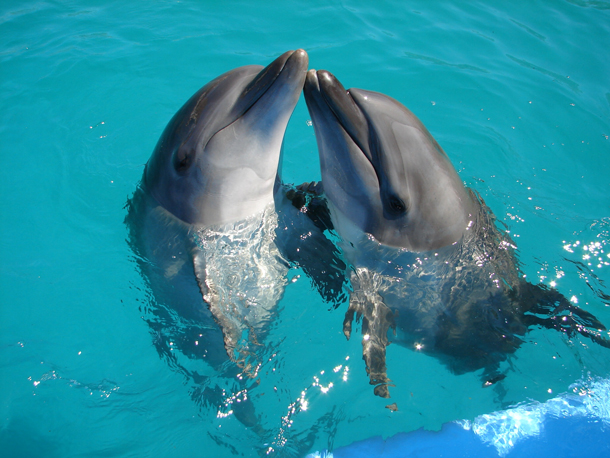
Bottlenose dolphins have an detailed social network and communicate through distinct herding and social calls. (Photo: Chase Cheviron, Flickr, CC BY-NC 2.0)
DOYLE: Yes. We calculated the channel capacity with and without boat noise. And we could say, okay, the humpback whales need to slow down this much. And they only slowed down 60% of that much. Here you're going 'Now, wait a second, they're herding herring, and they're making nets of bubbles. And it's important they get the whole message. How can they do with only 60% of the message?'
BASCOMB: And what's the answer?
DOYLE: Well, the answer was after a week or so of thinking about this, I went to make a copy of a paper. And I got it back to my desk from down the hall, and realized that the copier was low on toner. So I started to fill in the missing words.
BASCOMB: Ahh.
DOYLE: And that's when I realized: aha, they must have something equivalent to grammar and syntax and spelling rules. Because they are filling in the difference. They're going, 'I get the gist of it.' And the only way they could say that is if there are rules. So we went looking for rules structure in humpback whale, and we found it.
BASCOMB: So it'd be like if I was sending a text message or a Twitter or something, and you don't want to include so many words, you can start to drop articles, you can drop "the" and "a" and "to" and people still understand.
DOYLE: Exactly. That's exactly it, because there are rules.
BASCOMB: Now what about dolphins? I understand that you've looked at dolphin communication as well. What did you find there?
DOYLE: We found that it obeys Zipf's law, and that the number of, you might say, phonemes in dolphin is similar to human languages. And we did find that the babies are born babbling and learn their language the same way humans do. Well, babies babbling do not obey Zipf's law. Instead of this 45-degree slope, theirs is much flatter. So we recorded two little baby dolphins, bottlenose dolphins were born at Marine World, and they landed on babbling. They did not obey Zipf's law until they were 20 months old. The distribution of their whistles landed exactly on the same slope that babies babble. And you expect baby babbling to not obey Zipf's law because they're making kind of random sounds, they're trying out a new language.
BASCOMB: Right.
DOYLE: But anyway, so we were able to mathematically prove that baby dolphins are born babbling. And they learn their whistle language the same way humans do.
BASCOMB: So all of this begs the question, I mean, if every human language and most animal languages -- or many, at least, animal languages -- all have this feature in common, what does that say about our shared evolutionary origin? Or is this simply a feature that works well for communication, so nature continues to select for it?
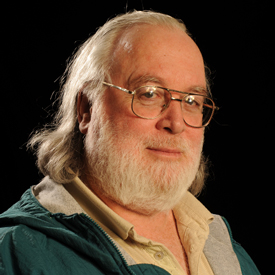
Laurance Doyle is an astronomer with SETI institute and President of PlanetQuest. (Photo: Courtesy of The SETI Institute)
DOYLE: It's like intelligence: if we have drawn a line about where intelligence starts, and some of the people that study intelligence, and in particular the origin and evolution of it, are beginning to see it as inseparable from the smallest critter to the largest critter. And we like to call that collective intelligence. But that's what we're expressing, too. We have no single individual, it's all kind of collective. And that requires inner communication. So I guess what I'm saying is there's a continuity of complexity in the communication systems of all the species on Earth, including, by the way, plants. I have a special paper I wrote on plant communicating with a, with an animal. A certain cotton plant sent an air traffic control communication to a wasp to tell it what plants to land on. And so I analyzed this communication system. So in other words, everything's around us communicating like crazy and I'm trying to get us not to stare up at the stars and say, 'Are we alone?' when you know, dolphins are tugging at our, our pants and saying, 'Habla espanol?' you know? --
BASCOMB: [LAUGHS]
DOYLE: -- 'Parlez-vous francais?' It's like, we've really got to quit staring off for intelligence. We need to recognize it here.
BASCOMB: Laurance Doyle is an astronomer for the SETI Institute and president of PlanetQuest. Thank you so much for your time.
DOYLE: You too. Thank you.
Related links:
- NAUTILUS | “Dolphins are Helping Us Hunt for Aliens”
- NOVA | “The Law all Languages Obey”
[https://www.youtube.com/watch?v=6ZZolcEwzK0 Jake Shimabukuro and his band, “Hula Girl” (live)]
Misfit Produce at Your Doorstep
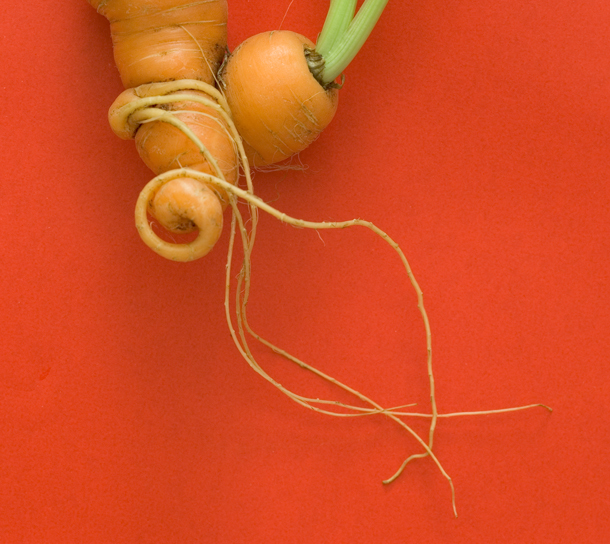
Much of US food is wasted because of aesthetic imperfections, like with this twisty carrot. (Photo: Brett Forsyth, Flickr, CC BY 2.0)
BASCOMB: In the US as much as a third of our food is wasted, left to rot on the vine or tossed in a landfill. Produce can pass through dozens of hands on its way to our plates including packing houses, produce agents, and storage facilities, and at every step there are opportunities for waste. In fact, if food waste were a country, it would be the third largest emitter of greenhouse gases after China and the US. But a crop of new companies think there could be an entrepreneurial solution – delivering less than perfect produce straight to the customer’s door step. I got my first delivery recently; my daughter helped me unpack it.
DAUGHTER: VEGETABLES!
BASCOMB: Vegetables! My goodness! What are these?
DAUGHTER: Cucumbers.
BASCOMB: Two big cucumbers.
DAUGHTER: Green beans!…
BASCOMB: That’s a lot of green beans.
BASCOMB: And, apples. Do you know anybody in our house who likes apples?
DAUGHTER: Me and Daddy!
BASCOMB: The apples had a couple bruises; I might have passed them by in the grocery store, but delivered to my door we’ll happily eat them. Companies like Hungry Harvest, Imperfect Produce, and Misfits Market are hoping to capitalize on that mindset. My box is from Misfits Market, founded by Abhi Ramesh in 2018 and he joins me now. Abhi, welcome to Living on Earth!
RAMESH: Thank you, thank you. Great, to, great to be here. Thanks for having me.
BASCOMB: So what does Misfits Market do? Can you please explain your business model for us?
RAMESH: Absolutely. So the simplest way of describing it is, we essentially rescue a lot of different types of produce that would otherwise go to waste in our food system. And we ship it directly to households. And the idea is that you can save money, and also help combat the global food waste problem by, by buying food from Misfits Market.
BASCOMB: And what kind of farms do you work with to get your produce?
RAMESH: Yeah, so we make it a priority of ours to work with non-commercial farms. And so we work with a pretty large variety of small, medium-size, and some that are even larger farms, but they're not sort of like big, big agricultural, commercial farms. And we work with them to sort of determine product that they otherwise wouldn't be able to sell, or a lot of times product that would be going to waste on the fields, going to waste in transit and storage. And we figure out what is consumable for human consumption and we repurpose it and ship it directly to people.
BASCOMB: And why would it otherwise be going to waste?
RAMESH: Yeah, so there's a lot of different reasons why, you know, food can go to waste in our food system. We generally think about it and bucket it into sort of three big buckets. The first one is aesthetic reasons. So there's a lot of produce, that simply wouldn't look great if it were sitting on grocery store and supermarket shelves. And so a lot of the large supermarket and grocery store chains won't actually go and purchase, you know, certain types of produce from growers, if it just looks off, right, if it's an apple that's not perfectly spherical, if it's a butternut squash that's shaped a little bit weird. If it's a cucumber that's too curved. So things that just have aesthetic imperfections; scarring falls in this category as well. That's one big bucket. The second big bucket is size constraints. So we'll have produce that are either too small or too large to sort of fit into the size restrictions that regular buyers would want. So we see some of that. And the third bucket, which I think a lot of people don't necessarily think about, is simply excess. So you know, nature operates in interesting ways and isn't necessarily always predictable. And buying patterns from large supermarkets and grocery chains are also not super, super in line with what growers are producing. So the food system produces a lot of excess accidentally, and we're able to purchase that and sell it to our subscribers at a big discount.
BASCOMB: And where would these imperfect and excess fruit and vegetables go if not for services like yours?
RAMESH: So today, there's not really--the short answer is there's not really an outlet for them. So if a grower is not able to sell stuff, they'll either toss it or they'll end up leaving it in the ground. So we, a lot of times we'll see farms that choose not to harvest something that they've grown just because they think there's not a market for it. And so all of the time, energy, and actual sort of resources that have gone into growing that product go to waste, because they get tossed. Sometimes we'll see that something is in transit, it goes to the wrong place, there's no place to store it so it gets dumped at a dumping or composting facility. So usually this stuff gets thrown out today.
BASCOMB: I mean, surely it could end up in a food pantry or something like that, though?
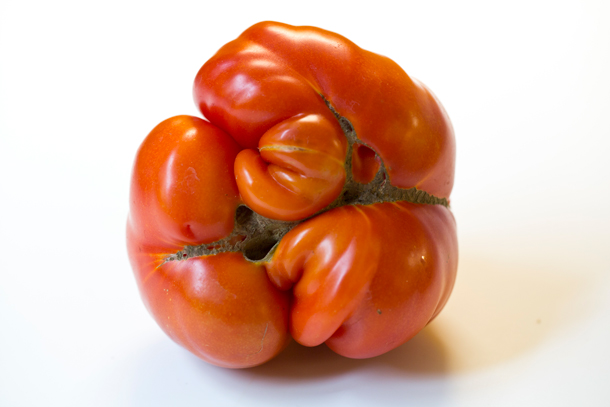
Not all tomatoes are beautiful. But even the ugly ones may be perfectly edible! (Photo: Silke Baron, Flickr, CC BY 2.0)
RAMESH: It's a good question. And I wish a larger chunk of it already did, the way the system works today. But unfortunately, if you look at the spectrum and the scale of all the farms and growers out there today, there's a very, very, very small number of them that actually have the infrastructure today to go and ship items consistently to food banks and food pantries. There's a very small number of food banks and food pantries that have the infrastructure to even go pick up stuff if they have to do that. So the answer is that a very small percentage of food waste would go to food pantries, and that's food waste that you know, we're not touching today. But the vast majority of it, it doesn't because that infrastructure doesn't exist. So we actually, at Misfits Market, we sort of see ourselves as building that kind of piping and that infrastructure where it didn't exist already. So we're aggregating food from a lot of different growers. We sell what we can to folks that want to save food, want to eat more affordably. And then we actually donate a pretty large chunk of it to food banks and food pantries.
BASCOMB: And I imagine, too, for the farmers, I mean, they have to pay somebody to go out and pick the beans and pick the squash. That's also expensive.
RAMESH: Exactly. Right. So because you know, for example, we work with a farmer that grows eggplant, and a lot of, like, the eggplant that's too small to actually sell to grocery stores, he leaves in the field. And if we said hey, can you just donate that, you know, for free? His answer would be, I guess I could, but someone, you know, someone has to sort of cover the cost of labor, cover the cost of transportation, of storage, for me to actually go do that. And so what we're saying is, hey, we'll do that. And so it's a win for you, and we'll actually pay you a little bit more than that, actually a lot more than that, so you make money on it. This is income that that farmer would not have had before. And so not only are they covering the cost of picking the produce, of storing the produce, of shipping the produce, they're also making money on food that they've grown and they're not harvesting otherwise.
BASCOMB: Now, how do you know that the produce in a Misfits Market box would actually have gone to waste? I mean, an ugly carrot, for example, can still be shredded, or a bruised tomato can be made into sauce or something, right?
RAMESH: Yeah. So you know, in theory, in a perfect world, in a very efficient system, you know, every farm that grows carrots, or every farm that grows tomatoes, also has an avenue for shredding carrots or canning tomatoes, or creating, you know, for apple growers, they have a way to create cider. But again, it's one of those things where the food system is quite inefficient as it is today to the point where, for every one grower that has access to, you know, a carrot shredder, there's twenty other carrot growers that do not today.
BASCOMB: Looking down the road, what do you see for the future of Misfits Market and this idea of avoiding food waste more generally?
RAMESH: Our goal over the next couple years is to really grow Misfits Market to be a national brand that sort of embodies a lot of things we want it to embody around affordability of food and sustainability and food waste. And my hope is that, as we do so and as we grow, we can involve more people in the food system, and really sort of push the envelope a little bit more when it comes to food waste. And also in the process, educate households and consumers on what they can do on their end to sort of tackle that food waste problem. And so our goal is to provide consumers with little tidbits that they can take and use on a daily basis, so that at scale, we're able to kind of make a much larger impact.
BASCOMB: And can you give me one or two of those tidbits? Maybe somebody's not quite ready to sign up for a weekly delivery, but what can they do in the interim?
RAMESH: Yeah, yeah. And our blog is a really good place for this. So we're putting out a post about how you can pickle and jar certain things in a very easy manner in your home, and it allows for a lot of things to last longer. We're teaching folks how they can, you know, use every single part of a piece of fruit and vegetable instead of throw it away. And there's really fun things, like you can even, you can use orange peels and grapefruit peels in your cocktails, you can create broth using pieces of fruits and vegetables that you probably wouldn't have used and could have tossed. So I think all of those are little examples. We're hoping we can add those and create a really big blog out of them.
BASCOMB: Abhi Ramesh is the CEO and founder of Misfits Market. Abhi, thanks so much for taking this time with me.
RAMESH: Thank you so much for having me.
Related links:
- The New Republic | “Does Your Box of “Ugly” Produce Really Help the Planet? Or Hurt it?”
- Food & Wine | “Why the Business of Ugly Produce Is So Complicated”
- Misfits Market
[MUSIC: https://www.youtube.com/watch?v=ILlRWANqalg (Artist TBD), “Pawpaw Patch”]
BASCOMB: Coming up – the new nature documentary series Our Planet. Part awe-inspiring cinematography, part warning about climate change. That’s just ahead on Living on Earth.
ANNOUNCER: Funding for Living on Earth comes from you, our listeners, and United Technologies, combining passion for science with engineering to create solutions designed for sustainability in aerospace, building industries, and food refrigeration. UTC companies such as Otis, Carrier, Pratt and Whitney, and UTC Aerospace systems are helping to move the world forward. You can learn more about United Technologies by tuning into the Race to Nine Billion podcast; listen at racetoninebillion.com. This is PRI, Public Radio International.
[CUTAWAY MUSIC: Jake Shimabukuro “Every Breath You Take” https://www.veojam.com/watch/1426402059 ]
Our Planet
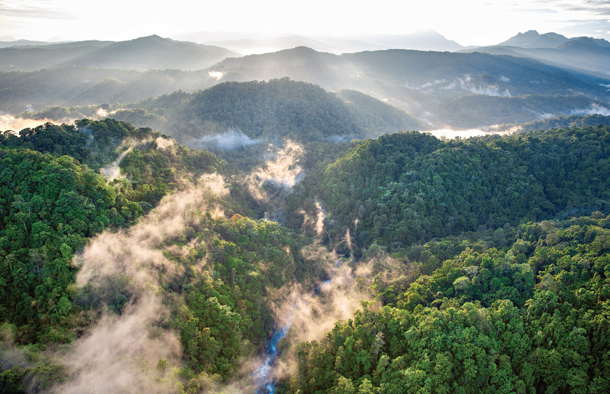
A streamside area of rainforest in Tawau Hills National Park, Sabah, on the island of Borneo. A strangler fig has enmeshed the buttress of a dipterocarp tree more than 260 feet tall. Borneo has the world's tallest rainforest trees—with the tallest being in this park. Borneo’s forests are also the oldest in the world, at more than 130 million years. (Photo: Reprinted with permission from Our Planet, by Alastair Fothergill, Keith Scholey, and Fred Pearce,copyright©2019. Published by Ten Speed Press, a division of Penguin Random House,LLC., CC Huw Cordey)
BASCOMB: It’s Living on Earth, I’m Bobby Bascomb.
Netflix recently released Our Planet, an 8-part nature documentary series narrated by the famous Sir David Attenborough.
[OUR PLANET MUSIC]
ATTENBOROUGH: This series will celebrate the natural wonders that remain and reveal what we must preserve to ensure people and nature thrive.
BASCOMB: At its heart, Our Planet is a celebration of the remarkable biodiversity of life on Earth. Each of the 8 episodes explores a different ecosystem and explains the interconnectedness of life in that place. In Antarctica Mr. Attenborough shows us the base of the food chain, a carpet of green algae growing on the bottom of the sea ice.
We see tiny krill come to eat the bright green algae until the translucent animals are green themselves. Then an aerial shot of massive humpback whales working together to blow air out their blow holes and form a perfect spiral.
[OUR PLANET MUSIC]
ATTENBOROUGH: As the spiraling net tightens the krill are driven closer together and then the whales lunge upwards and collect them.
BASCOMB: Just as your reverence for the collected effort of these massive creatures crescendos, David Attenborough delivers the gut punch of reality.
ATTENBOROUGH: In the last 50 years, with warming temperatures and disappearing sea ice krill stocks in this part of the southern ocean have more than halved.
[SOUNDS OF CRASHING WAVES]
BASCOMB: With their food disappearing humpbacks are also in sharp decline. Each ecosystem from the Arctic tundra to a tropical rainforest inspires awe and demands action. Keith Scholey is one of the lead producers of the series and a co-author of the companion book and he joins me now. Keith Scholey, welcome to Living on Earth.
SCHOLEY: Great to see you.
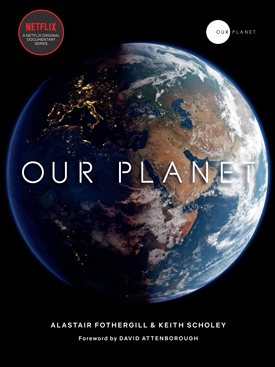
Our Planet is a three-part project involving a Netflix series, a companion book, and an interactive website. (Photo: Reprinted with permission from Our Planet, by Alastair Fothergill, Keith Scholey, and Fred Pearce,copyright©2019. Published by Ten Speed Press, a division of Penguin Random House,LLC.)
BASCOMB: So, a lot of our listeners may be familiar with Planet Earth, a similarly awe-inspiring nature documentary. But, Our Planet also delivers a powerful message about how humans are impacting these stunning ecosystems that you show us. Why take that approach with this series?
SCHOLEY: Well, my colleague at Silverback Films who I jointly made the series with, Alastair Fothergill, he did the original Planet Earth series with BBC. And both of us have been in the natural history business long time, and we wanted to make another big global natural history series. But this time, we wanted it to be about our time, because what has happened, and we've been watching the rapid decline of nature, and the idea of this series is to bring that decline to everyone's attention. Point out what the problems are, but very much also point to the solutions. We feel really frustrated, because you know, the natural world is collapsing for -- I think, doesn't need to, and people often get gloomy and think it's an inevitability. We just need to stimulate the world to do something about it.
BASCOMB: How did you come up with a name for this series? I mean, Our Planet, it implies something that belongs to us that we're responsible for.
SCHOLEY: Yeah, I have to say the Netflix team we work with they, they were the stimulus behind that. We had other ideas to talk about in terms of a title. But, Our Planet really fitted the bill because it is, it is ours. We're in the, what they call the age called the Anthropocene, which is the age of man, which means the world has new management, and that's us. So it's ours in terms of stewards. We have to manage it, we've taken it over. But, it's also our only home. So in a way, it's the title that really, really sums up the message.
BASCOMB: Yeah, we're pretty poor managers, I think.
SCHOLEY: At present, but we're about to get better. And we're going to get better fast. That's just the plan.
BASCOMB: We have to.
SCHOLEY: We have to, we do.
BASCOMB: There's also a beautiful hardcover book that goes along with the TV series. Why make a book companion to go along with this?
SCHOLEY: The project has three components. It has a television series. Then we have a big online site called ourplanet.com, which gives a lot more information about the problems and the solutions. But we very much wanted a book that pulled the two things together into one place. If you read this book, you will get the overall picture of the natural world right now, which is still incredibly rich. But, you'll also get the side that the website talks about, which are the problems and solutions and the way out. So the book, you get the whole project in one.
BASCOMB: How difficult was it to make this series? I mean, you were camped out in some pretty remote and uncomfortable places, I think.
SCHOLEY: Yeah, these wildlife shows are always hard. What happens when you make a wildlife show is you always try to show new things. And to be new, it means that no one's done them before. There's a good reason why they haven't done them before cause they're probably difficult. I often describe making wildlife films like paying off a blackmailer, where the audience is the blackmailer, they say 'Right. Well, we've had that -- show us more.'
BASCOMB: [LAUGHS]
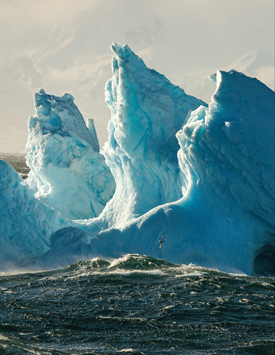
A Cape petrel, hunting krill, skims the waves in front of an iceberg in the Antarctic Peninsula’s Gerlache Strait. (Photo: Reprinted with permission from Our Planet, by Alastair Fothergill, Keith Scholey, and Fred Pearce,copyright©2019. Published by Ten Speed Press, a division of Penguin Random House,LLC., Justin Hofman)
SCHOLEY: And we always want to share more. So there is always that challenge of trying to reveal new things and, and that can be difficult and risky. The other challenge we had was to find that balance of this bigger story. Often with previous natural history shows, we've just gone for stories that really just showed you something new; this time, it had to show you something new, but it had to be a purpose behind it.
BASCOMB: What was one of your favorite or most memorable experiences working on this series?
SCHOLEY: I think the most memorable thing that we actually shot, which is not necessarily my favorite, but we filmed this extraordinary gathering of walrus in the Arctic. Hundred thousand animals on one beach. The total population of pacific walrus is probably only about 120 [thousand]. So you've got most of the global population of this species marooned on one beach. And they're only marooned there because the ice is gone. Because walrus like to live out on the sea ice. They rest on the sea ice and jump off it and forage down. And, they've been driven to this place by climate change. I think that that scene probably epitomizes the state of our planet right now, the future wildlife faces. And it's, it's very, very moving. And, I think that's probably the biggest takeaway kind of moment.
BASCOMB: And, you're leaving out what happens to those walruses on this beach. I mean, I watched that and I thought, oh, there's so many there's so much potential, there's so much possibility, you know, there's so many of them left. And, then, you go on to talk about the fact that there's not enough room. So, some of them are forced up a mountain, you know, here you have these large pinnipeds that are not supposed to be climbing a mountain, and then they can't get down.
SCHOLEY: No, absolutely and, and they literally walk off the cliff trying to get back to the sea. Because these are animals that have no experience of height. This is an environment they're not used to. They've never evolved to go to these places. And, so, these disasters happen. But the overall thing is, is that, them being forced to swim huge distances to these haul out sites is exhausting them. They're all getting in bad condition. And, every year, the ice records are showing that the Arctic ice is disappearing, in 20, 30 years’ time we’ll probably have completely ice free Arctic in the middle of the summer. This is a world that we have not experienced for the last 2 million years. So it's a big change.
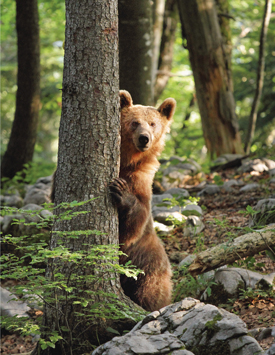
A nervous brown bear peeks out from behind a tree in Slovenia. Its home is mixed deciduous and pine forest in mountains, which has survived logging and where bears have survived persecution. Today,more than half of Slovenia is forested, with a population of about 500 brown bears. Conservationists believe their spread to the Alps now depends on a significant reduction in the numbers killed by hunters and a trans-boundary nature-conservation area being established between Slovenia and Croatia. (Photo: Reprinted with permission from Our Planet, by Alastair Fothergill, Keith Scholey, and Fred Pearce,copyright©2019. Published by Ten Speed Press, a division of Penguin Random House,LLC., Bruno Ca)
BASCOMB: And, what about the emotional toll for you, I mean, for instance, there's a scene where a baby seal gets picked off by a polar bear. And that's nature, that's fine. But then we learn that it was only eaten because the ice season is so short, that the mother couldn't make a proper den for it and protect it.
SCHOLEY: So, if you're going to film natural history, you see suffering, and there's, the natural world has a wonder to it. But it has a cruel side. You get used to some of it, you expect it but it's always hard to watch and hard to be there. And then there's a big decision then about what you show and what you don't show because the audience hasn't seen the full sort of context of what you're watching. It's a little bit like news reporting. You have to be very careful that you tell an accurate story, but you don't traumatize the audience in the process. But I think the hardest thing, though, is seeing whole, whole habitats going down the tube. I mean, like coral reefs. We still dive on these amazing reefs, it's harder to find amazing reefs. But the science tells us that in 50 years, they're almost certainly all gone. And that idea that the coral reef habitat of our oceans, we could have removed in a century, and these habitats have been around for at least 200 million years -- is staggering, and very depressing.
BASCOMB: I think really, the take home message from the series for me is that there's so much left, there's so much left worth protecting. Is that how you see it as well?
SCHOLEY: Completely! And, the thing is, it's not nice to have. The thing about life on earth, it gives stability to the earth. This earth without life went through billions of years of being a raging monster. And finally, life actually calmed it down and brought about stability. And it’s this iterative process, that as the world becomes more stable life becomes more complex, and that makes it more stable, da-de-da-de da. And, the moment humans stepped foot on this planet, the planet was probably at its most stable it's ever been at. And we've only been able to have agriculture and everything like this, because of the stability nature gives the world. If you start taking that stability out, I mean, our agricultural systems won't function. If rainy seasons and seasons go all over the shop. It doesn't work like that. So we have to partner with nature. So conservation is now not about not to have-- it is an essential part of what we need to drive the system that we've thrived on. I think we have to get that message through really, really hard. And there's kind of a sense of, oh, 'Isn't it sad that all these things are going extinct?' Yeah, it's really sad. It's really sad for us. Because if they go extinct, they go unstable. The ocean goes unstable, the atmosphere becomes unstable, the soil becomes unstable. We can't function like that.
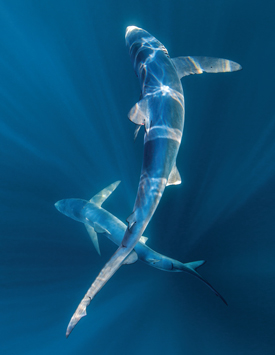
Blue sharks—the most abundant and widespread oceanic shark but also the most heavily fished. About 20 million are caught every year, in drift nets and especially on longlines set for other fish, such as swordfish or tuna, and the unrecorded catch may be a third more. Though blue shark meat is considered almost worthless and most bodies are discarded at sea, there is a lucrative market in the fins. As with so many oceanic fish species, there is no accurate population estimate, and much is unknown about its biology, but declines are being observed across its range. (Photo: Reprinted with permission from Our Planet, by Alastair Fothergill, Keith Scholey, and Fred Pearce,copyright©2019. Published by Ten Speed Press, a division of Penguin Random House,LLC., Oliver Scholey)
BASCOMB: I think that's what's really special about this series to me is that you see the big picture, you see the, you know how ocean currents work together to feed different ecosystems. And then you also tell these tiny stories of a mushroom, and a single bird. Which are, you know, of course, illustrative of the whole. And I think that's really a powerful aspect of it.
SCHOLEY: It's the tiny stuff, often that binds the complexity together, which gives nature its strength, and brings stability to the planet. And so often, I think people forget. I mean, there's a huge disaster happening with insects being wiped out, largely by pesticides. But it's the little guys, the insects and what have you that bind our world together. And you never know at what point you're going to really miss them, but we will miss them. They do so many sort of complex functions.
BASCOMB: And, of course, this series came out just before the United Nations biodiversity report was released. And that report estimates that as many as a million species will go extinct in the next few decades as a result of human activities. Does that add a sense of urgency to you for this project?
SCHOLEY: Yeah, the whole thing now is about time. And the series took us four years to kind of make it so you know, good third of the barrier reef bleached and died. You know, this is possibly the biggest ecological catastrophe in the history of humanity. And it almost went by without a whimper. And you think, Wow, it's happening so fast, and we haven't even got the series out. Yeah, time is not on our side now. I think, you know, most scientists, most people who know about this would agree the next 10 years are crucial to be able to start turning things around.
BASCOMB: How do you hope that people might react to watching this series or reading the book?
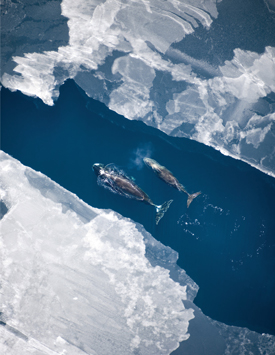
A bowhead whale and her calf surface in the Arctic Ocean ice off the northern coast of Alaska. Bowheads live among the ice floes, feeding on planktonic animals such as copepods. Extremely thick skulls allow them to break through seven-inch ice when they need to create breathing holes. (Photo: Reprinted with permission from Our Planet, by Alastair Fothergill, Keith Scholey, and Fred Pearce,copyright©2019. Published by Ten Speed Press, a division of Penguin Random House,LLC., Amelia Brower, NOAA Fisheries Service)
SCHOLEY: I hope, first and foremost that people are inspired by the fact there's still fantastic things in the sort of natural world. You know, that's, that is the basic thing, if you're inspired by it, you value it. The next thing is I hope people will have a positive view that nature is important to us as individuals. And there's so much that can be done to make it better. Some of the things that are happening to our world right now are just crazy. They're stupid. You take the open ocean, you know, it is being destroyed by a bunch of fishing fleets run by a handful of countries working unprofitably, those fleets are subsidized. And all they are actually catching are luxury goods. Shark's fin. That's to add a texture to a soup. We're killing 100 million sharks a year. That's a billion sharks a decade. And that is undermining the biggest carbon sump we possibly have to fight climate change. This is ridiculous. And I just hope that people will, will understand that the destruction of nature, there's so many elements of it, it's ridiculous. We'll look back on this, like we look back now on-- we were destroying the whales of the world. And in 1986, we just had one meeting. It was the International Whaling Commission. Had a meeting, got together, decided to stop whaling. That decision has brought most whale species, you know, right back. And with that, a more productive ocean. These are the sort of things we have to look at and just say, look, let's stop the silly stuff. Let's, let's move on, let’s sort this. And I hope the project does that.
BASCOMB: For those people that are listening now and watch the series, what do you suggest that they do to take meaningful action to avoid that dark place? I mean, what can one person do?
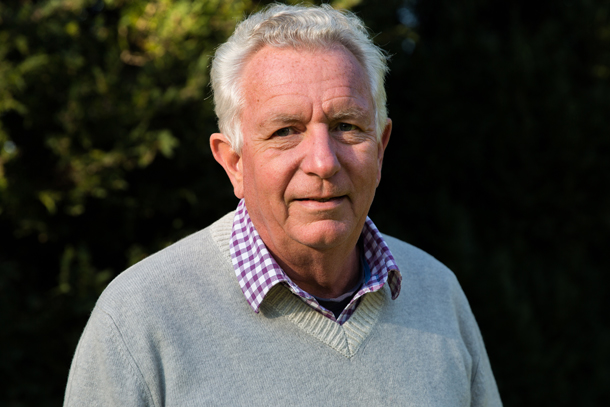
Keith Scholey is co-author of the Our Planet book and one of the lead producers for the Our Planet Netflix series. (Photo: Reprinted with permission from Our Planet, by Alastair Fothergill, Keith Scholey, and Fred Pearce,copyright©2019. Published by Ten Speed Press, a division of Penguin Random House,LLC., Olly Scholey)
SCHOLEY: I think there are two kind of strands to this thing. I think all of us can do small things, we can look at what we consume. And I think there's a huge thing in just -- don't waste. I mean, don't waste energy, don't waste food, don't waste time. I think the most powerful thing we can do, though, is demand things change. Because at the end of the day, change will come about because politicians bring about change. And business leaders can bring about change. And so I think if consumers and voters want change, you start to move the dial. And I think I've really noticed, you know, in the last couple of years, people are really waking up and you get the sense certainly young people want change. They want a different world. I think that's the most powerful thing we can do. You need that public, you know, kick up the backside to say 'Yeah, go for it! We'll support you. We want this.' And, that is changing and that gives me a lot of hope.
BASCOMB: Keith Scholey is author of Our Planet and one of the lead producers of this series. Thank you so much for taking this time to chat with me.
SCHOLEY: It's been a real pleasure.
Related links:
- Discover the Our Planet website
- More information about the Our Planet book
[BIRDNOTE THEME]
BirdNote®: Ruddy Duck
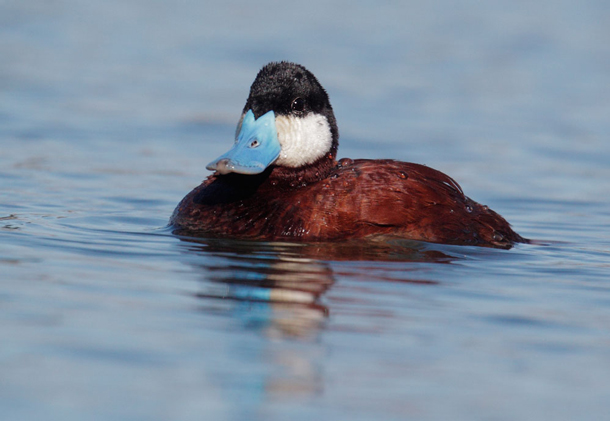
The Ruddy Duck’s bright blue bill is one of the distinguishing features of this colorful bird. (Photo: © Tom Grey)
BASCOMB: In marshy lakes and ponds across North America, the spring breeding season may bring the colorful Ruddy Duck. With a black head, white face and blue bill the ducks stand out in a crowd but they may be best known for their creative courtships. BirdNote’s Michael Stein has more.
BirdNote®
Ruddy Duck
[Ruddy Duck bubbling display]
STEIN: This strange sound is a male Ruddy Duck, performing his bubbling display.
[Ruddy Duck bubbling display]
When the sexes meet on the breeding grounds, usually a warm, weedy lake in the western interior, the males of these pudgy little ducks get right to strutting their stuff.
[Ruddy Duck bubbling display]
When a female appears, the male raises his long tail and his head, with feathers on it that look like horns. He inflates his neck, and faster and faster, strikes his chest with his bill. These blows force air through the feathers, causing the water to bubble. The male’s display ends with his head and tail jerking forward, and a low belching sound.
[Ruddy Duck bubbling display]
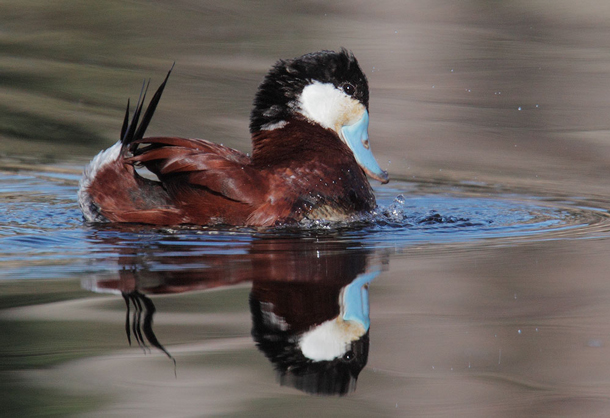
Male Ruddy Ducks show a bubbling display during the mating season to attract a partner. (Photo: © Tom Grey)
Whenever you hear this, watch for a bright rufous-red duck with black-and-white head and sky-blue bill. After the bubbling display, the male will usually run across the water with rapidly beating wings, his feet putt-putting like a little motorboat.
[Ruddy duck display sounds]
Stay by the water, and you’ll hear this motorboat alternating with the bubbling display again and again.
[Ruddy Duck bubbling display, then motor boating]
###
Written by Dennis Paulson
Audio of the Ruddy Duck display provided by The Macaulay Library at the Cornell Lab of Ornithology, Ithaca, New York. Recorded by G.A. Keller.
BirdNote's theme music was composed and played by Nancy Rumbel and produced by John Kessler.
Producer: John Kessler
Executive Producer: Chris Peterson
© 2015 Tune In to Nature.org May 2017/2019 Narrator: Michael Stein
ID# 050707RUDUKPLU RUDU-01b
https://www.birdnote.org/show/ruddy-duck
BASCOMB: For pictures, paddle on over to our website, loe dot org.
Related links:
- National Audubon Society | “Ruddy Duck”
- Learn more on the BirdNote® website
[MUSIC: David Grisman Quintet, “Dawgnation”]
BASCOMB: Living on Earth is produced by the World Media Foundation. Our crew includes Naomi Arenberg, Paloma Beltran, Thurston Briscoe, Jenni Doering, Don Lyman, Lizz Malloy, Aynsley O’Neill, Jake Rego, Joseph Winters, and Jolanda Omari. Tom Tiger engineered our show. Alison Lirish Dean composed our themes. You can hear us anytime at L-O-E dot org, iTunes and Google play- and like us, please, on our Facebook page - PRI’s Living on Earth. We tweet from @livingonearth. And find us on Instagram at livingonearthradio. Our Executive Producer, Steve Curwood, will be back next week. I’m Bobby Bascomb. Thanks for listening!
ANNOUNCER: Funding for Living on Earth comes from you, our listeners, and from the University of Massachusetts, Boston, in association with its School for the Environment, developing the next generation of environmental leaders. And from the Grantham Foundation for the protection of the environment, supporting strategic communications and collaboration in solving the world’s most pressing environmental problems. Support also comes from the Energy Foundation, serving the public interest by helping to build a strong, clean, energy economy.
ANNOUNCER 2: PRI, Public Radio International.
Living on Earth wants to hear from you!
Living on Earth
62 Calef Highway, Suite 212
Lee, NH 03861
Telephone: 617-287-4121
E-mail: comments@loe.org
Newsletter [Click here]
Donate to Living on Earth!
Living on Earth is an independent media program and relies entirely on contributions from listeners and institutions supporting public service. Please donate now to preserve an independent environmental voice.
NewsletterLiving on Earth offers a weekly delivery of the show's rundown to your mailbox. Sign up for our newsletter today!
 Sailors For The Sea: Be the change you want to sea.
Sailors For The Sea: Be the change you want to sea.
 The Grantham Foundation for the Protection of the Environment: Committed to protecting and improving the health of the global environment.
The Grantham Foundation for the Protection of the Environment: Committed to protecting and improving the health of the global environment.
 Contribute to Living on Earth and receive, as our gift to you, an archival print of one of Mark Seth Lender's extraordinary wildlife photographs. Follow the link to see Mark's current collection of photographs.
Contribute to Living on Earth and receive, as our gift to you, an archival print of one of Mark Seth Lender's extraordinary wildlife photographs. Follow the link to see Mark's current collection of photographs.
 Buy a signed copy of Mark Seth Lender's book Smeagull the Seagull & support Living on Earth
Buy a signed copy of Mark Seth Lender's book Smeagull the Seagull & support Living on Earth

